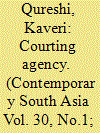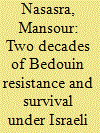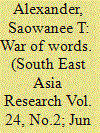|
|
|
Sort Order |
|
|
|
Items / Page
|
|
|
|
|
|
|
| Srl | Item |
| 1 |
ID:
185579


|
|
|
|
|
| Summary/Abstract |
Sharia councils have been in existence in England since the 1980s, providing advice and guidance in matters of Islamic family law. The vast majority of their users are women applying for Islamic divorces. The ulamā (scholars) at the councils encourage reconciliation and only grant divorces where this is deemed impossible. This paper, based on observations at a large sharia council in East London, supplements earlier institutional analyses by focusing not on what the ulamā are doing, but on what women are doing at the council. The paper identifies a spectrum of compliance with the council and its procedures, ranging between those who say they just want what the sharia wants, to foot-dragging, actively contesting the ulamā and exiting the council. Further, these forms of engagement may change over time. Overall, the paper contributes by illustrating the complexity of British South Asian Muslim women’s identities and affiliations and engaging with questions of gendered agency. It is clear that even when women petitioners contest, confront or exit the council, they may inscribe their moves within, rather than in opposition to, Islamic norms and values. The paper draws out the wider political implications of this non-opposition between Islamic subject positions and agency.
|
|
|
|
|
|
|
|
|
|
|
|
|
|
|
|
| 2 |
ID:
174143


|
|
|
|
|
| Summary/Abstract |
Using archival data and newspaper collections from Britain and Israel, and extensive fieldwork interviews in the Naqab, this article breaks new ground through a critical examination of the Bedouin and their way of surviving and resisting Israeli military rule, 1948–1967. I argue that creative nonviolent resistance, everyday resistance and sumud (steadfastness and resilience), succeeded in modifying and mitigating the military rule strategies deployed by the state to control the Arab Bedouin, opening up the possibility of further political action and communal protection. By employing sumud as everyday resistance, the Bedouin improved their livelihood, strengthened one another and helped consolidate sumud, to the point where sumud became part of their culture and way of life during the military rule. Everyday sumud strategies were through border economy and contact with their relatives across the border, which utilized the strong relationships between tribes. Smuggling goods was a central form of economic survival and sumud. Everyday resistance and nonviolent actions succeeded in marginalizing military rules, restrictions, and power, allowing the Bedouin to gain immediate benefits including many of their daily needs. The Bedouin maintained their cross-border relations and continued to resist cooperation with the Israeli military rule. Hosting their fellow refugees was a daily act of sumud by the Bedouin despite the imposition of new state borders. The Bedouin also found different avenues to claim their dispossessed properties, and continued to resist Israeli confiscation of their land. They lodged land claims through every level of military rule, responding to different Israeli forms of power and the effect of domination.
|
|
|
|
|
|
|
|
|
|
|
|
|
|
|
|
| 3 |
ID:
146534


|
|
|
|
|
| Summary/Abstract |
Thai grassroots activists known as ‘redshirts’ (broadly aligned with former prime minister Thaksin Shinawatra) have been characterised according to their socio-economic profile, but despite pioneering works such as Buchanan (2013), Cohen (2012) and Ünaldi (2014), there is still much to learn about how ordinary redshirts voice their political stances. This article is based on a linguistic approach to discourse analysis and builds on Fairclough’s (2003) arguments concerning the ways in which speakers use intertextuality and assumption to construct social and political difference and consensus. It specifically explores redshirt understandings of democracy by examining intertextuality and presupposition through various linguistic strategies. It sets out to answer these questions: What are grassroots redshirt protesters’ understandings of democracy? How do they articulate those understandings verbally? The study is based on an analysis of 12 interviews conducted in 2012 with grassroots redshirts from Ubon Ratchathani, Thailand. It shows how informants voiced notions of democracy by making explicit intertextual references and alluding to implicit meaning through presupposition. The results show that informants had a definite understanding of democracy despite a degree of contradiction, confusion and ambiguity. They also attempted to communicate political beliefs despite limits on their freedom of expression.
|
|
|
|
|
|
|
|
|
|
|
|
|
|
|
|
|
|
|
|
|